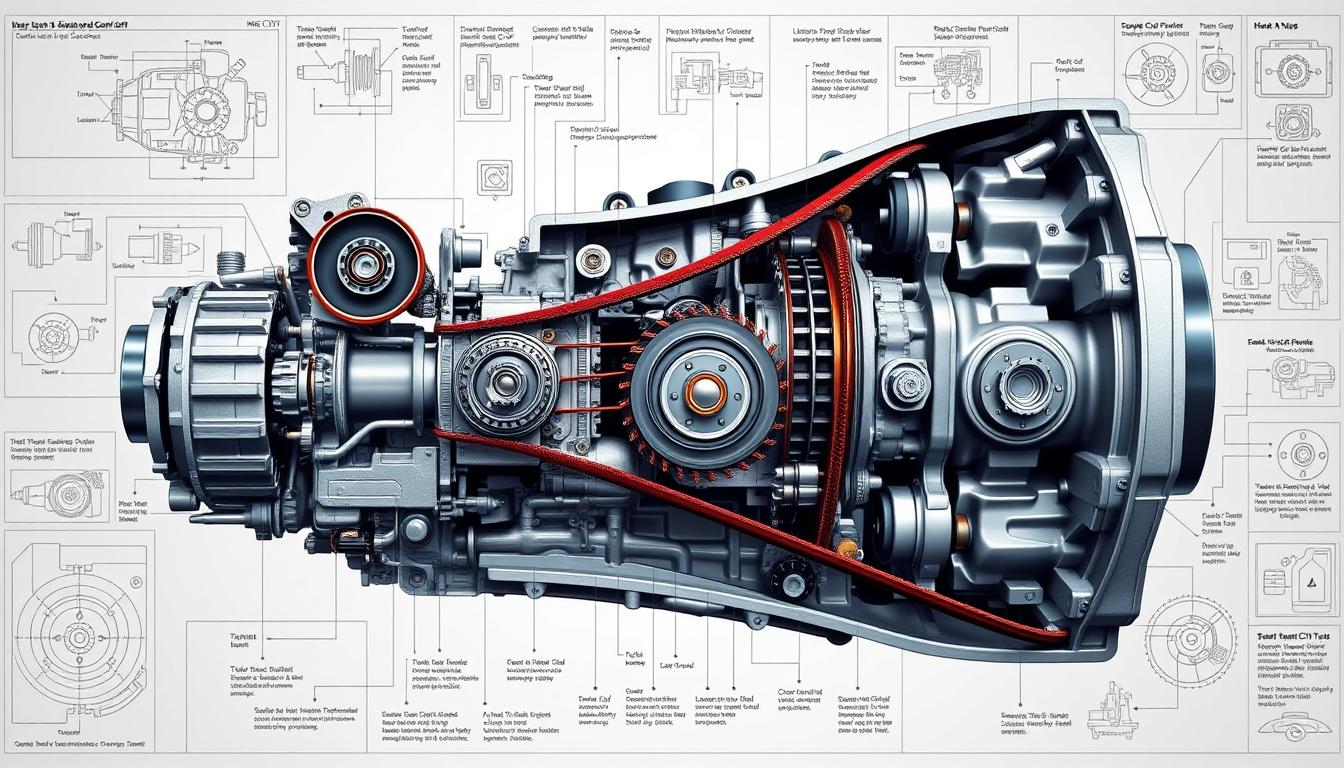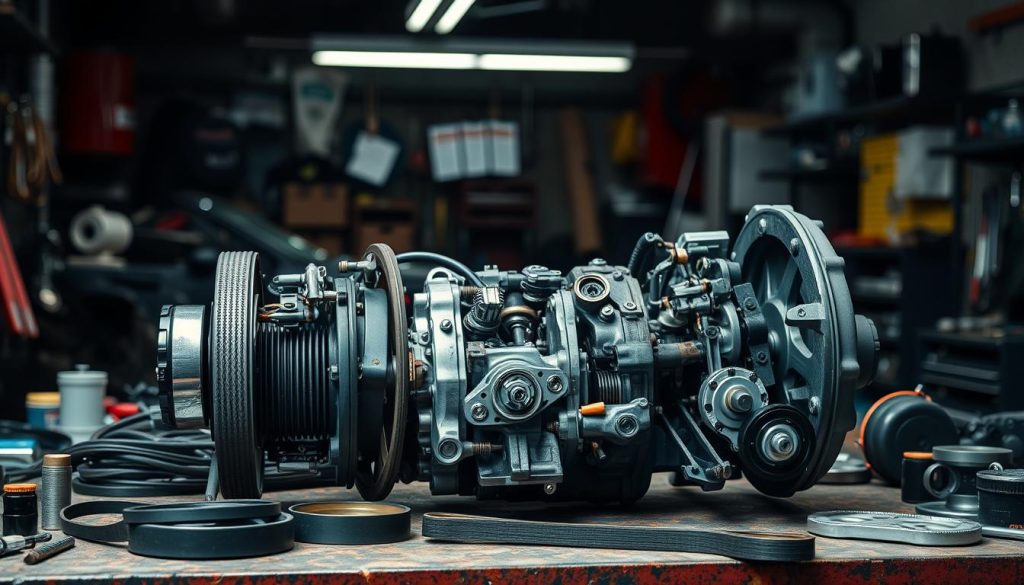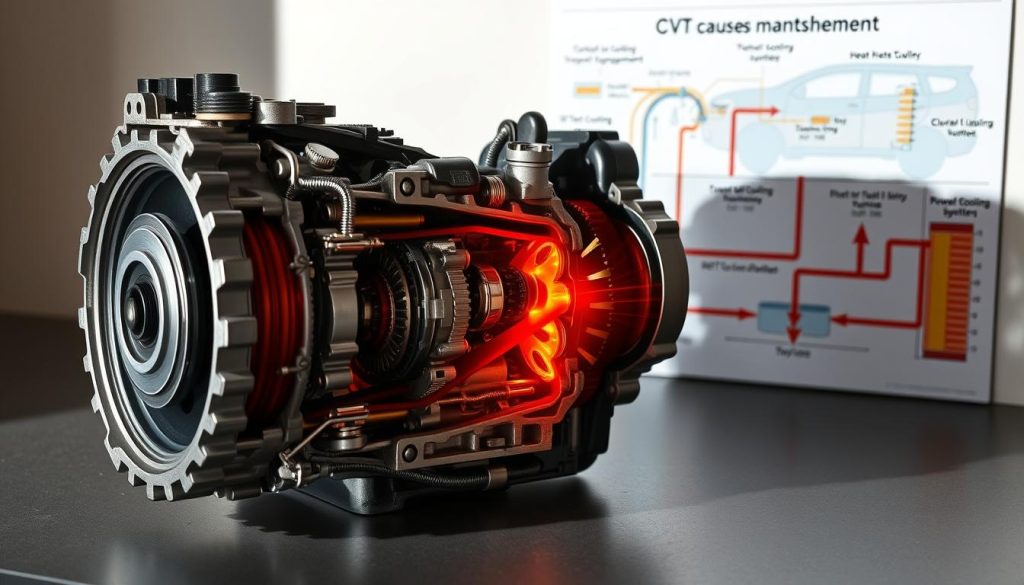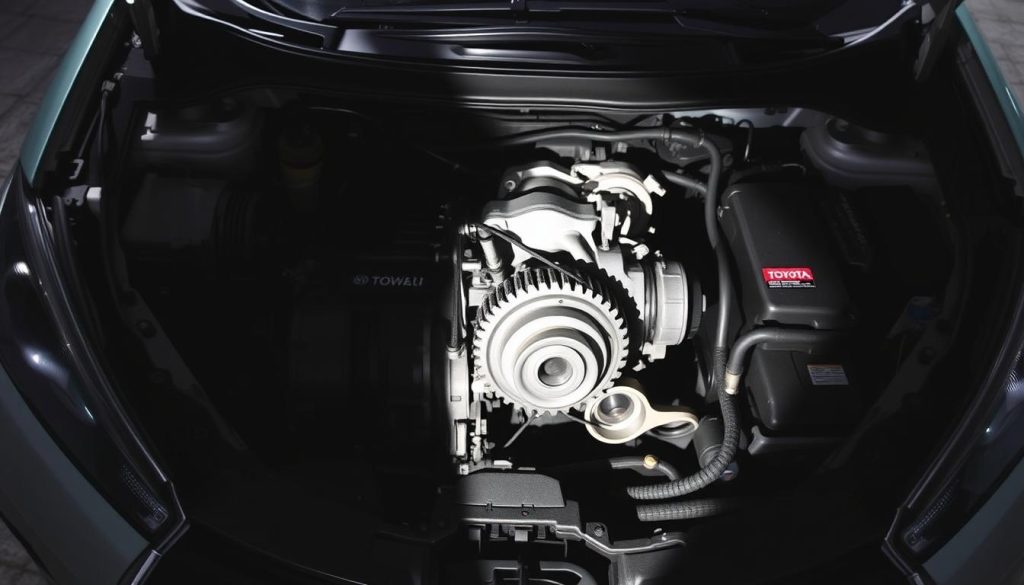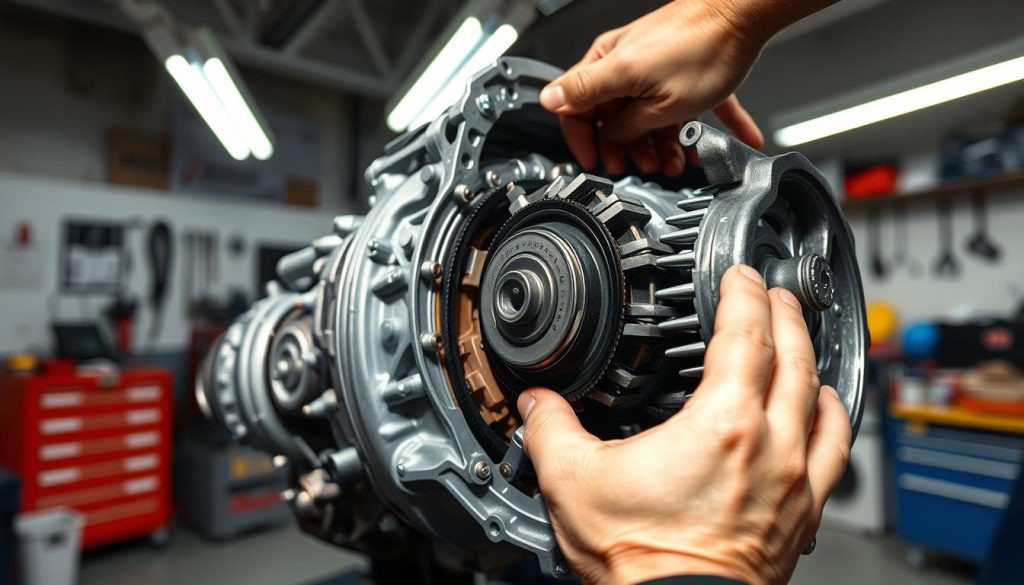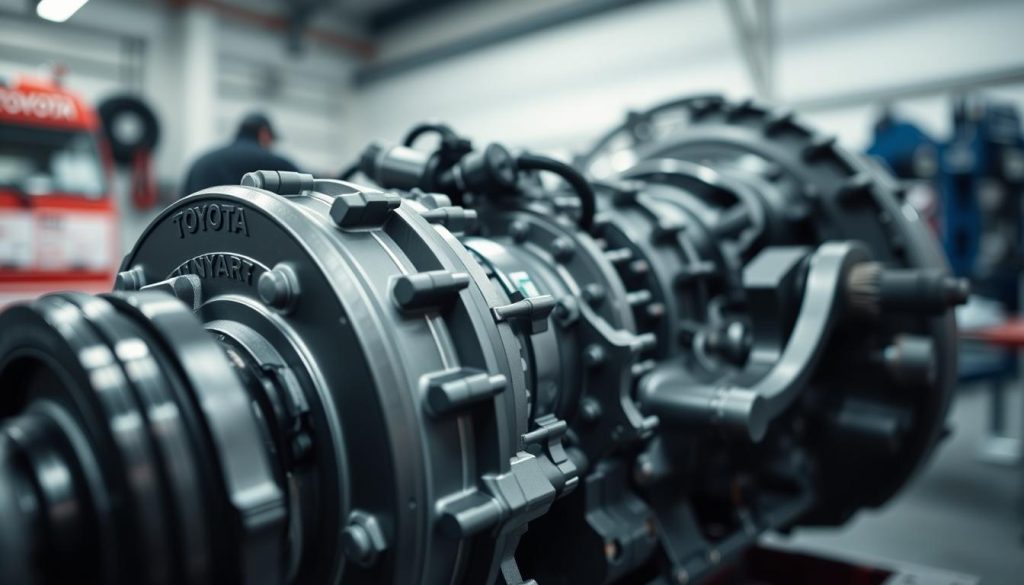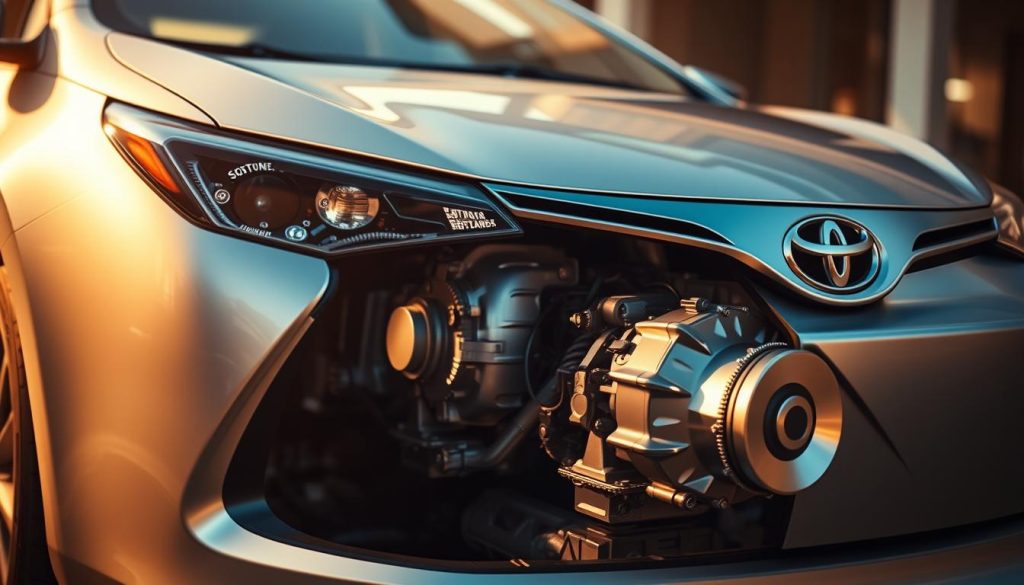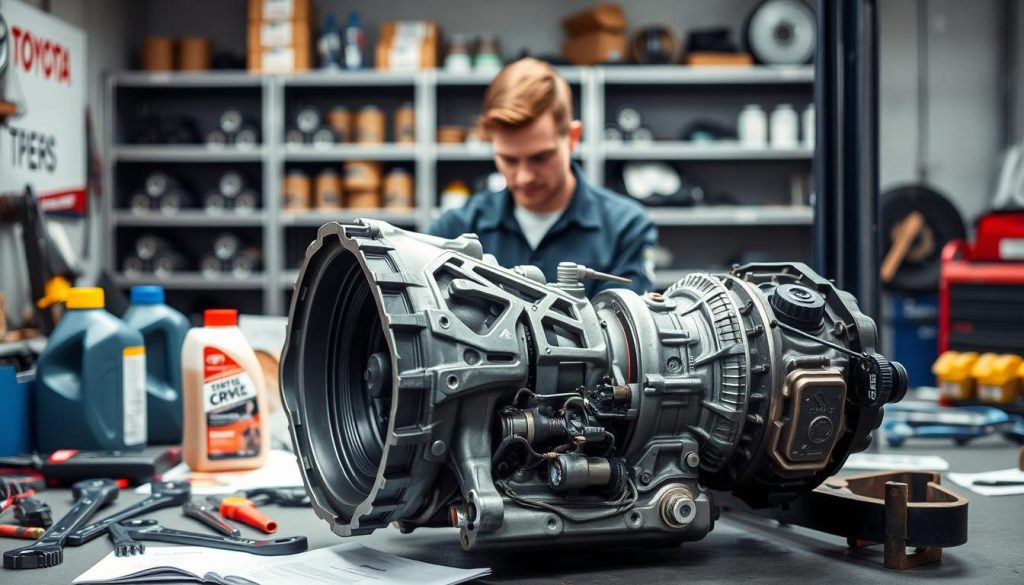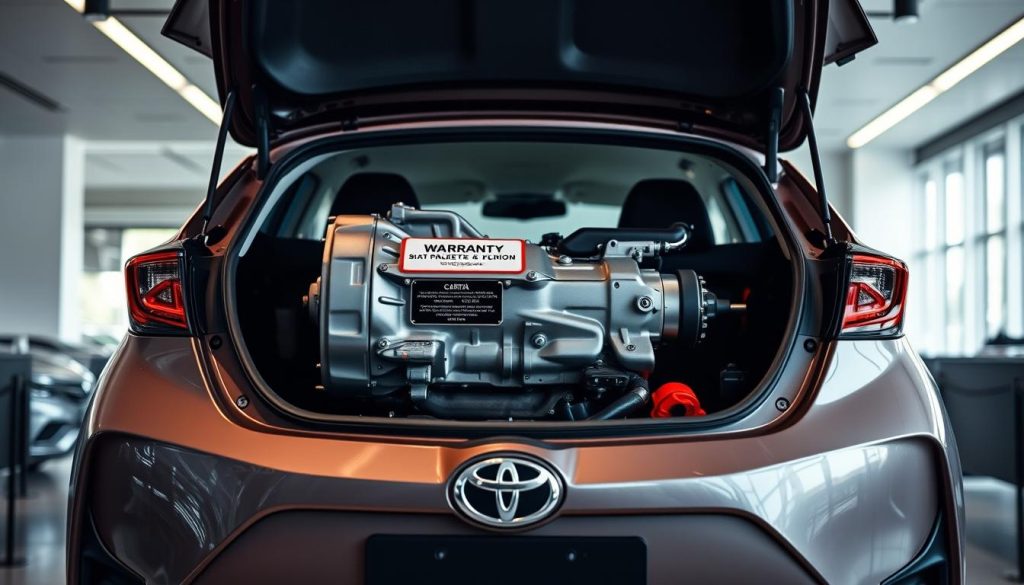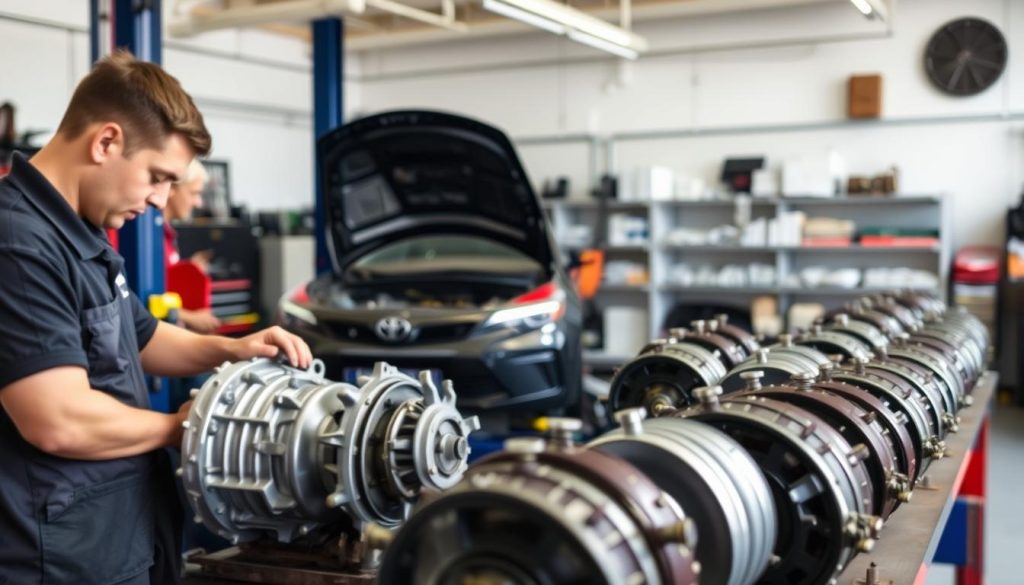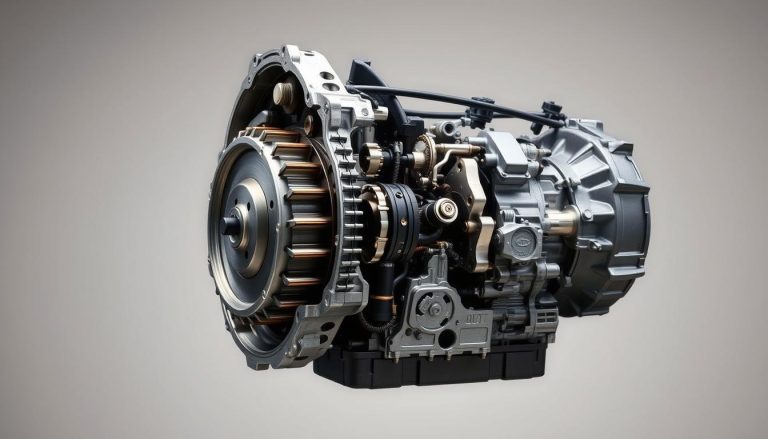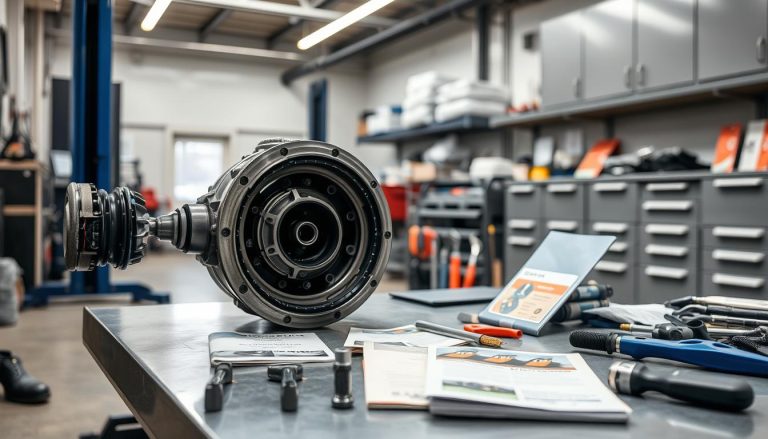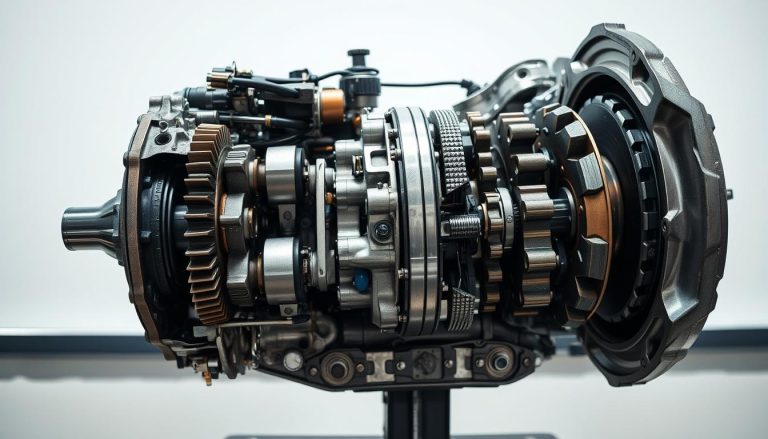Toyota CVT Transmission Problems: What to Know
Running into Toyota CVT transmission issues can be really frustrating. Problems like delayed acceleration and overheating are common. These issues can make your car hard to drive and expensive to fix.
Knowing about these problems can help you take care of your car. This includes fixing unusual noises and shuddering. It’s all about keeping your car in good shape and avoiding big repair bills.
This article will go into detail about Toyota CVT failure. We’ll cover the signs, causes, and fixes for these problems. Being proactive can keep your car running well and prevent costly repairs.
Keep reading to learn more about CVT problems in Toyota cars. We’ll give you tips to keep your transmission in top shape.
Introduction to Toyota CVT Transmissions
Toyota’s Continuously Variable Transmissions (CVTs) change the way we drive. They don’t use gears like old automatics. This makes driving smoother and more efficient.
CVTs use a pulley system for endless gear ratios. This means better speed transitions and fuel use. It’s a favorite among those who love efficient driving.
Toyota CVT fans love its ease and dependability. Keeping it in top shape is key. Regular checks and fluid changes are vital. This way, drivers get the most out of their CVT, enjoying a smooth ride.
Here’s how CVTs compare to traditional automatics:
| Feature | Traditional Automatic Transmission | Toyota Continuously Variable Transmission |
|---|---|---|
| Gear System | Fixed Gears | Infinitely Variable Gears |
| Shifting Experience | Stepped Shifting | Smooth, Seamless Shifting |
| Fuel Efficiency | Moderate | High |
| Maintenance | Complex | Easier with Regular Toyota CVT Maintenance |
In short, Toyota’s CVT technology boosts car performance and driver happiness. With the right care, these transmissions are reliable and offer a great driving experience.
Common Toyota CVT Problems
Toyota CVT issues have become a concern for some owners. Overheating is a big problem. It can cause serious damage if not fixed quickly. Also, unusual noises from the transmission might mean there’s a mechanical issue.
Another common issue is transmission slipping. This can really hurt your car’s performance. If not fixed, it can also make your car use more fuel and drive less efficiently.
Knowing about these problems helps owners take care of their cars better. Regular maintenance and quick repairs can make your CVT system more reliable. This leads to a smoother ride for everyone.
Signs Your Toyota CVT May Be Failing
Spotting the signs of CVT failure in your Toyota can help you catch problems early. This can prevent major damage. Here are some important symptoms to look out for.
Delayed Acceleration
Delayed acceleration is a sign of CVT trouble. If your car takes longer to speed up, it might mean the CVT is failing. This could be due to issues with the transmission belt or pulleys.
Overheating
Overheating is a big warning sign. A CVT that gets too hot can be seriously damaged. Always check for unusual heat during use as part of regular checks.
Unusual Noises
Strange noises are early signs of CVT failure. Listen for whining, grinding, or odd sounds while driving. These sounds may mean the CVT is wearing out and need a proper check.
Shuddering or Jerking
Shuddering or jerking when you speed up or slow down are common CVT failure symptoms. These movements can point to problems with fluid levels or parts inside, needing quick action.
Transmission Slipping
If your transmission slips out of gear or can’t keep a steady speed, it’s a clear sign of CVT trouble. Fixing this symptom early can stop more damage.
Reasons Behind Toyota CVT Issues
Understanding why Toyota CVTs fail is key to fixing problems. Poor maintenance is a big reason. Not changing the fluid regularly can cause friction and overheating.
Factory defects can also hurt CVT performance. Even Toyota’s high standards can’t prevent all defects. These issues might need recalls or repairs.
Wear and tear is another factor. CVTs, like any part, face stress that can cause problems over time.
Let’s explore these causes to understand their impact on Toyota CVT issues:
| Cause | Impact | Prevention |
|---|---|---|
| Poor Maintenance | Accelerated wear, overheating | Regular fluid changes, inspections |
| Factory Defects | Immediate failure, recalls | Warranty checks, manufacturer recalls |
| Wear and Tear | Gradual decline in performance | Routine maintenance, timely repairs |
Delayed Acceleration in Toyota CVT
Toyota owners with Continuously Variable Transmissions (CVTs) might face delayed acceleration. This section will explore the causes, symptoms, and solutions for this common problem.
Causes of Delayed Acceleration
Several factors can cause delayed acceleration in Toyota CVTs:
- Worn transmission belts that reduce power transfer efficiency.
- Transmission fluid issues, like contamination or low levels, can harm CVT performance.
- Software glitches can also affect acceleration timing.
Symptoms to Watch For
Spotting a CVT acceleration problem early can avoid bigger issues. Look out for these symptoms:
- Noticeable delay after pressing the accelerator pedal.
- Sluggish speed gain overall.
- Recurring hesitation, often when starting from a stop.
Potential Solutions
Fixing Toyota CVT issues requires several steps:
- Regular transmission fluid changes to keep fluid levels and quality right.
- Check and possibly replace the transmission belt if it’s worn.
- Update the vehicle’s software to fix any CVT acceleration problems.
By tackling these steps, owners can improve their vehicle’s performance and avoid more issues with delayed CVT acceleration.
Overheating Problems in Toyota CVT
Overheating in Toyota CVT transmissions is a big problem. It can cause a lot of damage. Knowing the
Causes of Overheating
Low transmission fluid levels and poor fluid quality often cause CVT overheating. These problems make it hard for the system to handle heat. This leads to high temperatures when you’re driving.
Inadequate cooling makes things worse. It raises the risk of serious damage to the transmission. By understanding the causes of CVT overheating, you can take steps to protect your transmission.
How to Address Overheating
To tackle overheating, consider these steps:
- Regularly check and maintain optimal transmission fluid levels.
- Ensure the fluid used is of high quality and meets manufacturer specifications.
- Schedule routine inspections to identify any cooling system failures.
- Replace old or degraded fluid to restore cooling efficiency and prevent CVT overheating.
By following these tips, you can solve CVT overheating problems. This ensures your Toyota CVT system lasts longer and works better.
Unusual Noises in Toyota CVT
If you hear strange sounds from your Toyota CVT, it might mean there’s a problem. These noises often point to mechanical issues that could harm your car’s performance and lifespan.
Common Noises and Their Causes
CVT transmission sounds you might hear include whining, rattling, and humming. Let’s explore what these noises might mean:
- Whining: This sound is often due to worn bearings or problems with the transmission fluid.
- Rattling: It could mean loose parts or parts that are wearing out in the CVT.
- Humming: This might be caused by an unbalanced tire or worn bearings.
Steps to Fixing Noisy Transmissions
Fixing Toyota CVT noises quickly can stop bigger problems and make driving better. Here’s how to fix CVT noises:
- Diagnose the Issue: Look closely to find where the noise is coming from. You might need to use both your eyes and special tools.
- Fluid Check: Make sure the CVT fluid is at the right level and is good quality. If not, you might need to add or replace it.
- Replace Worn Parts: If the noise is from worn-out parts, you’ll need to replace them to quiet the CVT.
- Professional Service: For tricky problems, it’s best to get help from a certified Toyota mechanic. They can fix CVT noises well and fast.
Shuddering and Jerking Issues in Toyota CVT
Feeling your Toyota CVT shudder can really ruin your drive. It’s key to find out why and fix it for a smooth ride.
Root Causes and Solutions
Shuddering and jerking in your Toyota CVT usually come from worn-out clutches or old fluid. These problems can mess up your car’s transmission. It’s important to act fast to fix them.
- Clutch Wear: Your Toyota CVT’s clutch can wear down, making it hard to shift smoothly. Getting it checked or replaced can help a lot.
- Fluid Degradation: CVT fluid gets old and dirty from heat and friction. Changing it regularly keeps your transmission running smoothly.
Here are some ways to fix CVT jerking:
- Regular fluid service: Change the CVT fluid as your Toyota’s manual suggests to avoid problems.
- Inspect and replace worn parts: Check your transmission often and swap out any parts that are not working right.
| Common Issue | Probable Cause | Recommended Fix |
|---|---|---|
| Shuddering | Clutch Wear | Replace Clutch |
| Jerking | Fluid Degradation | Fluid Change |
Knowing why your Toyota CVT shudders and fixing it can make your car last longer and run better.
Transmission Slipping in Toyota CVT
Transmission slipping in Toyota CVT transmissions is a big worry for car owners. Spotting the signs early and knowing how to fix it are key to keeping your car running well.
Identifying Transmission Slipping
One common sign of Toyota CVT slipping is when the engine revs but the car doesn’t speed up. Other signs include:
- Delayed acceleration when you press the gas pedal.
- Unusual increase in RPMs without speed gain.
- Feeling of the transmission struggling to engage properly.
Noticing these symptoms early can help in diagnosing CVT slip issues. This is important for quick repairs.
Fixing Transmission Slipping
After spotting the signs of transmission slipping, it’s important to act fast. Steps might include:
- Checking and replacing transmission fluid to ensure proper lubrication.
- Examining the condition of drive belts and replacing them if worn.
Fixing CVT slipping can sometimes need complex steps. It’s best to get a professional technician for accurate diagnosis and repair.
Being proactive with Toyota CVT slipping issues can prevent expensive repairs and keep your transmission running longer.
Toyota CVT Recall Information
The Toyota CVT recall has caught a lot of attention. It affects several models due to a problem with the CVT transmission. This issue could cause unexpected behavior in the transmission. It’s important for owners to know which models are recalled to avoid any risks.
Here’s a detailed table of the affected models and years:
| Model | Year | Issue |
|---|---|---|
| Toyota Corolla | 2018 – 2020 | Potential transmission failure |
| Toyota C-HR | 2018 – 2019 | Shuddering and jerking |
| Toyota RAV4 | 2019 | Delayed acceleration |
| Toyota Camry | 2018 – 2020 | Transmission slipping |
If your vehicle is on this list, you need to follow Toyota’s recall instructions. You’ll likely get a notice with steps to take. This includes going to a Toyota dealership for a free check-up and any needed fixes.
This recall shows Toyota’s dedication to making sure its cars are safe and reliable. By fixing these problems quickly, Toyota wants to keep its high standards and make customers happy.
Toyota CVT Reliability
When thinking about Toyota CVT transmissions, knowing what affects their lifespan is key. This knowledge helps in keeping them running well for a long time. It’s all about getting the most out of your car.
What Owners Should Know
One big worry is how long a Toyota CVT lasts. Keeping it in good shape is essential. This means changing the fluid on time and driving smoothly.
Also, watch out for any strange sounds or problems with acceleration. These could mean there’s an issue with your CVT.
Long-term Reliability
Toyota CVTs have a good track record if you take care of them. They’re made to make driving smooth and efficient. This helps them last longer.
Make sure to follow the maintenance schedule and keep up with any updates from Toyota. This will help your CVT stay reliable for years.
Importance of CVT Maintenance
Keeping your Toyota CVT transmission in good shape is key to its long life and performance. Regular care helps your car run smoothly and avoids expensive fixes later. Let’s explore important CVT maintenance tips to keep your transmission running well.
Regular Fluid Changes
Changing your CVT fluid regularly is a must. The fluid’s quality drops over time, losing its ability to lubricate and cool. Toyota suggests changing it every 30,000 to 60,000 miles. Fresh fluid keeps your CVT running smoothly and efficiently.
Software Updates and TSBs
Keeping your CVT updated with software changes and Technical Service Bulletins (TSBs) is also vital. A CVT software update can improve performance and fix problems. TSBs help address issues with certain models, giving you better transmission performance. Following these updates keeps your CVT running well and lasts longer.
Toyota CVT Warranty Coverage
Knowing about the Toyota CVT warranty can ease worries about your car’s CVT transmission. Toyota’s warranty covers many parts and services of the CVT. This warranty means you won’t have to pay for repairs if they happen during the warranty time. Here’s what’s covered and how to get these services.
The Toyota CVT warranty includes parts like pulleys, drive belts, and electronic systems. It lasts for 5 years or 60,000 miles, whichever comes first. If a manufacturing defect affects the CVT’s performance or life, Toyota will fix it for free.
- Covers essential parts like pulleys, drive belts, and control systems
- Standard warranty duration: 5 years or 60,000 miles
- Cost-free repairs for manufacturing defects
| Feature | Details |
|---|---|
| Parts Covered | Pulleys, Drive Belts, Control Systems |
| Duration | 5 Years or 60,000 Miles |
| Cost | No Charge for Manufacturing Defects |
To use your transmission warranty, go to a Toyota service center if you notice CVT problems. Keep records of maintenance and repairs to make claiming easier. Fixing issues early helps keep your Toyota running well.
Cost of Toyota CVT Repairs
Fixing a Toyota CVT transmission can be pricey. Knowing the cost and finding affordable services helps. Several things affect the price, so it’s good to know them to save money.
Factors That Affect Repair Costs
The price to fix a CVT can change for many reasons:
- Vehicle Model and Year: Newer or luxury cars cost more to fix because they’re more complex.
- Extent of Damage: Small problems like fluid leaks are cheap to fix. But big issues might need a whole new transmission, which is pricier.
- Parts Availability: How easy it is to find parts affects the price. OEM parts are pricey but reliable.
- Labor Costs: Mechanics in different places charge differently. More skilled ones might ask for more.
Ways to Mitigate High Repair Costs
To keep CVT repair costs down, try these tips:
- Regular Maintenance: Following your car’s maintenance schedule helps avoid big problems. Don’t forget to change the fluid and update the software.
- Get Multiple Quotes: Don’t accept the first price you hear. Look around to find the best deal.
- Consider Aftermarket Parts: Using quality aftermarket parts can save money. They work well and are cheaper than OEM.
- Warranty Coverage: Check if your car is under warranty. You might not have to pay for repairs.
Working with a Lemon Law Attorney for Toyota CVT Issues
Dealing with Toyota CVT problems can be tough. But, knowing the Lemon Law can help a lot. A good Lemon Law attorney can guide you through the legal maze. They make sure your rights are looked after and you get what you deserve.
Many CVT lemon law claims happen when the transmission keeps failing. This is often after the car maker or repair shops can’t fix it.
In the US, each state has its own Lemon Laws. These laws protect car buyers. A Toyota CVT legal help expert knows these laws well. They help by collecting evidence, documenting repairs, and talking to the car maker or dealer for you.
Hiring a Lemon Law attorney has many benefits. They can get you a new car, a full refund, or money. This is very important for Toyota owners with serious CVT issues. These problems can make the car unsafe or worthless. It’s best to get Toyota CVT legal help early to make sure your claim is valid and on time.
The steps to follow are:
- First, talk to a Lemon Law attorney
- Then, they will check your case and collect evidence
- After that, they will file your claim and negotiate
- If needed, they will handle court cases for you
For Toyota owners, getting help with CVT lemon law claims is key. It helps fix the transmission problems. This way, you can get your car back to normal and feel at peace again.
Conclusion
Understanding Toyota CVT transmissions is key to keeping your car running well. This guide has covered common problems like slow starts, overheating, and strange noises. Spotting these issues early can save you from costly repairs.
Keeping your CVT in good shape starts with regular care. Make sure to get your car checked often, change the fluid, and update the software. These steps help your car run smoothly and last longer.
Looking after your transmission can make driving better. By using the tips from this guide, you can handle any CVT problems. Remember, being aware and acting fast is the best way to deal with CVT issues.
FAQ
What are some common Toyota CVT problems?
Toyota CVT transmissions often face issues like delayed acceleration and overheating. You might also hear unusual noises, experience transmission slipping, or feel shuddering during acceleration.
What is a CVT and how does it differ from traditional transmissions?
A CVT, or Continuously Variable Transmission, doesn’t have traditional gears. Instead, it offers smooth, continuous gear ratios. This makes driving smoother and can improve fuel efficiency compared to regular transmissions.
How can I identify the signs of a failing Toyota CVT?
Look out for signs like delayed acceleration, overheating, and strange noises. Shuddering movements and transmission slipping are also red flags. Spotting these early can help avoid bigger problems.
What causes delayed acceleration in Toyota CVT transmissions?
Delayed acceleration often stems from worn belts or low transmission fluid. It’s noticeable when you press the accelerator and there’s a pause.
What are the possible solutions for overheating in Toyota CVT transmissions?
Overheating can be fixed by checking and topping off fluid levels. Replacing old fluid and ensuring the cooling system works well is also key. Regular maintenance helps prevent overheating.
Why might my Toyota CVT make unusual noises?
Noises like whining or rattling might mean worn bearings or fluid issues. It’s wise to get the transmission checked and fixed to stop these sounds.
What should I do if my Toyota CVT is shuddering or jerking?
Shuddering or jerking could be due to worn clutches or fluid problems. Fluid service or replacing parts might solve the issue. A professional should diagnose and fix it.
How can I address transmission slipping in my Toyota CVT?
Slipping, where the engine revs but doesn’t accelerate, might be due to low fluid or worn belts. Replacing fluid or belts can fix it. Sometimes, more complex repairs are needed.
Are there any recalls for Toyota CVT transmissions?
Yes, some Toyota models with CVT transmissions have had recalls. If your car is affected, contact your dealer for repairs or more information.
How reliable are Toyota CVT transmissions in the long term?
Toyota CVT transmissions are usually reliable. But, regular maintenance is essential for their long life. Keeping up with fluid changes and addressing issues early helps.
What maintenance is essential for Toyota CVT transmissions?
Regular fluid changes and software updates are critical. Following Technical Service Bulletins (TSBs) also helps keep your CVT in good shape.
What does Toyota’s warranty cover for CVT transmissions?
Toyota’s warranty covers defects in workmanship and materials for a certain time. Check your warranty details to understand what’s covered and how to claim services.
What factors influence the cost of repairing a Toyota CVT?
Repair costs depend on the damage, parts needed, and labor rates. Regular maintenance and fixing small issues early can help manage costs.
How can a Lemon Law attorney help with unresolved Toyota CVT issues?
A Lemon Law attorney can help with chronic problems. They can file claims for refunds or replacements if your car doesn’t meet quality standards.

